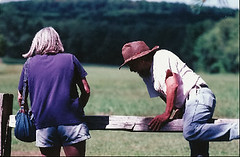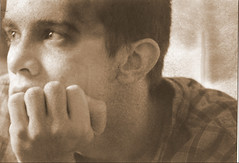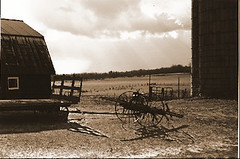Sommarnattens Leende (1955)
Dir. Ingmar Bergman
Writ. Ingmar Bergman
w/ Eva Dahlbeck, Ulla Jacobsson, Harriet Andersson, Margit Carlqvist, Gunnar Björnstrand
Bergman is at his wiliest in this fantastic romp -- fantastic in the sense that the inner lives of his women take precedence over the somewhat more prosaic (though no less funny) roles of the men, a contrasty juxtaposition that sheds ample light. He opens on the aging but trim Mr. Egerman, a man of fairly decent reputation with an Achilles heel. He has married a woman he admires who is much too young for him and all but spurned an old flame, whose name he can't seem to help but calling out while clutching his own poor wife's breast in his sleep. He can't start back up with his old lover because she is now mistress to a very possessive military man, and it could get him killed. His only comfort is his work and the quiet of his study, but in the meantime, his son Henrik has fallen in love with the beautiful Anne Egerman and has become quite the moody little clergyman, flirting with the housemaid in an effort to quell his rampant and overpowering emotions. This is perhaps the man's only relief, so that he needn't check on his wife and son every hour that he can spare...for Anne Egerman is still chaste, and he wouldn't want to wait in vain. [1]
Bergman appears to be making a lot of clipped statements at once, using his own subtle sense of humor in melodrama and just wonderful sets and costumes. There are it seems, in the society of the well-to-do in 1950s Sweden, a few rules. Unless you are drinking wine, you must be served a drink which will require a spoon, be this some sort of ade (which would be served in the day time) or a nightcap. Also, if you happen to have a wife and a mistress and can't decide which to be jealous of more, you will be subject to arrangements made by the two of them without your knowledge to discover the truth of the matter, which is the secondary plot.
Egerman faces off with his would-be rival in a retreat at his old lover's family estate, where unhappy (or idle) women are making sure that there will be trouble as they try to tamper with love and honor for lovely and honorable reasons. Leave it to Bergman. While this all sounds very soap opera-esque, his treatment of the subject matter has depth, great insight, and textures that range from squeaky-dry dialogue lines to the poetry of wine-drunk love-making at dawn. Anne Egerman, as the central figure, is a precocious homemaker full of whimsy and unrealized dreams, which make her both enchanting and a little bit useless at the regimental running of a great house. Being more like a guest in her own home provides the perfect time and atmosphere in which she and Henrik find each other.
There's something of the "life goes on" quality here, applied with wit, that is not so much dark as it is strict. While a great many dramas are being created by the restless and unfaithful, there will still always be a great need for people to try the great experiment that is marriage, as exemplified by the housemaid who is so busy trying to catch a man that she hardly notices the turmoil going on around her.
You can keep a straight face for as long as you like, but you will laugh whether you like it or not. Bergman wouldn't hear of it otherwise.
[1] Even if you find the subject matter a bit Victorian, you'd have to agree this is a brilliant set-up, and a nice contrast to his later, moodier works, I think.















0 Comments:
Post a Comment
<< Home